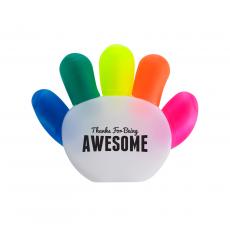What Is a Morale Committee and Morale Budget?
In today's workplace, employee engagement is no longer a nice-to-have... It's a must-have. A well-organized morale committee and a clearly defined morale budget can be powerful tools for building a positive work culture, reducing turnover, and improving team satisfaction. In this guide, we'll break down what these concepts are, how they work, and how your company can implement them effectively to keep teams happy and motivated all year long.
Understanding the Role of a Morale Committee
A morale committee is a dedicated group within an organization responsible for planning and executing initiatives that boost employee morale. This team serves as the heart of workplace culture, ensuring employees feel recognized, appreciated, and connected. While HR teams often oversee broad engagement strategies, morale committees handle the day-to-day efforts that make work more enjoyable and meaningful.
What Does a Morale Committee Do?
The morale committee's main role is to plan and coordinate employee engagement activities throughout the year. These may include appreciation events, themed days, contests, team-building outings, and celebrating milestones like work anniversaries or birthdays. The committee also ensures consistency in engagement efforts and serves as a liaison between leadership and staff when it comes to cultural feedback or ideas.
Who Should Be on a Morale Committee?
An effective morale committee should include a diverse cross-section of the organization. This typically includes representatives from various departments and levels of seniority. Involving both managers and frontline employees ensures a variety of perspectives and more inclusive planning. Participation should be voluntary but recognized, as it often requires time and energy outside of day-to-day roles.
Benefits of Having a Morale Committee in the Workplace
Companies with active morale committees tend to see increased employee engagement, better communication across departments, and improved retention. These committees help create a positive environment where employees feel valued, which can lead to higher productivity and stronger team loyalty. They also relieve pressure from HR and leadership by sharing the responsibility of culture-building across the organization.
Understanding the Role of a Morale Committee
A morale committee is a dedicated group within an organization responsible for planning and executing initiatives that boost employee morale. This team serves as the heart of workplace culture, ensuring employees feel recognized, appreciated, and connected. While HR teams often oversee broad engagement strategies, morale committees handle the day-to-day efforts that make work more enjoyable and meaningful.
What Does a Morale Committee Do?
The morale committee's main role is to plan and coordinate employee engagement activities throughout the year. These may include appreciation events, themed days, contests, team-building outings, and celebrating milestones like work anniversaries or birthdays. The committee also ensures consistency in engagement efforts and serves as a liaison between leadership and staff when it comes to cultural feedback or ideas.
Who Should Be on a Morale Committee?
An effective morale committee should include a diverse cross-section of the organization. This typically includes representatives from various departments and levels of seniority. Involving both managers and frontline employees ensures a variety of perspectives and more inclusive planning. Participation should be voluntary but recognized, as it often requires time and energy outside of day-to-day roles.
Benefits of Having a Morale Committee in the Workplace
Companies with active morale committees tend to see increased employee engagement, better communication across departments, and improved retention. These committees help create a positive environment where employees feel valued, which can lead to higher productivity and stronger team loyalty. They also relieve pressure from HR and leadership by sharing the responsibility of culture-building across the organization.
What Is a Morale Budget?
A morale budget is a designated portion of company funds set aside specifically for employee engagement and appreciation initiatives. Just like marketing or operations have line items in a budget, workplace culture deserves financial support too. A well-planned morale budget empowers committees and leaders to plan intentional, impactful experiences without scrambling for resources.
Examples of How Companies Use Morale Budgets
Morale budgets can be used for a wide variety of employee-focused initiatives. Here are some examples of how organizations typically allocate these funds:
- Birthday and anniversary gifts for employees
- Monthly themed events like "Fun Fridays" or "Treat Yourself Tuesday"
- Company-branded swag to welcome new hires or celebrate milestones
- Team lunches or coffee breaks to celebrate accomplishments
- Holiday parties and seasonal events like virtual gift exchanges
How to Set a Morale Budget Based on Team Size or Headcount
There's no one-size-fits-all formula, but many organizations start by allocating a fixed dollar amount per employee per quarter or per year. For example, a morale budget of $100–$250 per employee annually can support a mix of events, gifts, and spontaneous appreciation moments. Consider scaling the budget based on company size, number of locations, and event frequency.
What Can Be Included in a Morale Budget?
Your morale budget should cover everything needed to make employees feel appreciated and connected. Here are a few key categories:
Employee Appreciation Events
From catered lunches to after-work gatherings, events help build camaraderie and show the team that their efforts are seen and celebrated.
Holiday Gifts and Team Swag
Branded merchandise, seasonal thank-you gifts, and personalized tokens go a long way in boosting morale—especially during the holiday season or at year-end reviews.
Lunches, Treats, and Celebrations
Small gestures like coffee runs, cupcakes for birthdays, or Friday breakfast spreads may seem simple, but they add up to a culture of appreciation when done consistently.
Building a Morale Committee and Budget That Works
Creating an effective morale program requires more than good intentions—it needs alignment with company values, thoughtful planning, and a way to measure success. When done right, a morale committee and budget can serve as key drivers of employee engagement and retention.
Aligning with Company Values & Goals
Morale initiatives should reflect the culture you want to build. Whether your company values collaboration, innovation, or well-being, your committee's efforts should reinforce those ideals. For example, if wellness is a core value, consider incorporating mental health days or fitness-themed challenges into your morale calendar.
Creating a Year-Round Morale Calendar
A proactive morale calendar helps avoid last-minute scrambling and ensures consistent engagement throughout the year. Start with tentpole moments like Employee Appreciation Day, company anniversaries, and holidays, then build in monthly or quarterly events. Balance large celebrations with simple gestures to maintain momentum and manage the budget wisely.
Measuring ROI and Impact on Employee Engagement
While morale is difficult to quantify, tracking feedback and participation can help measure success. Use surveys, suggestion boxes, and engagement metrics like attendance and recognition program usage to refine your approach. The goal isn't to spend more, but to invest wisely in what actually motivates your team.
Ideas for Morale-Boosting Initiatives
Looking for inspiration to put your morale budget to good use? Whether you're working with a small team or managing a company-wide engagement plan, there's no shortage of creative ways to uplift your employees. Below are ideas that span budgets, seasons, and occasions—designed to keep morale high all year long.
Low-Cost, High-Impact Morale Ideas
You don't need a huge budget to make a meaningful difference. Thoughtful, consistent gestures often go further than flashy events. Here are a few ideas:
- Handwritten appreciation notes from managers
- Recognition shoutouts in team meetings or Slack channels
- Flexible “leave early” or mental health days
- Peer-nominated awards with small gift cards or tokens
- Company-sponsored volunteer days
Seasonal & Holiday-Specific Morale Ideas
Use the calendar to guide your planning. Seasonal initiatives create anticipation and foster team traditions. Examples include:
- Spring “Refresh Kits” with branded water bottles and snacks
- Summer treat carts with popsicles or iced coffee
- Fall-themed gift boxes with pumpkin treats or cozy swag
- Winter holiday cards paired with Successories desktop gifts
Incorporating Recognition Gifts from Successories
Successories offers a wide variety of affordable, customizable gifts perfect for stretching your morale budget. From motivational desk accessories to engraved awards and team-themed swag, our selection is curated to help morale committees deliver impact without overspending. Bulk options and seasonal collections make it easy to find the right fit for every occasion.
Pro Tip: Browse our Employee Gifts and Appreciation Gifts categories to find gifts that align with your recognition goals and budget.
Frequently Asked Questions
Still have questions about morale committees or budgeting for employee engagement? Here are some of the most common ones answered.
What is a morale committee?
A morale committee is a group of employees tasked with planning and executing events, initiatives, and recognition activities that promote positive workplace culture. These committees help keep employees engaged, connected, and appreciated year-round.
What is a morale budget?
A morale budget is a portion of a company's funds set aside for team engagement, appreciation events, and employee recognition. It covers things like team lunches, employee gifts, holiday celebrations, and other initiatives that boost morale and culture.
How much should a company spend on morale?
Many companies allocate between $100–$250 per employee per year for morale initiatives, depending on company size, industry, and goals. The key is to plan thoughtfully and choose activities that align with your culture and make employees feel truly valued.
What can be included in a morale budget?
Morale budgets typically include employee gifts, catered meals, holiday events, company swag, team-building activities, and recognition programs. Any initiative aimed at improving team spirit and workplace satisfaction can be considered part of the morale budget.
How do you start a morale committee?
To start a morale committee, begin by inviting volunteers from different departments. Define roles, set a regular meeting cadence, and align your efforts with company goals and values. Be sure to get leadership support and a designated budget to execute ideas effectively.

































